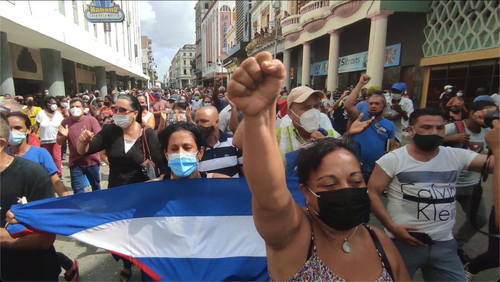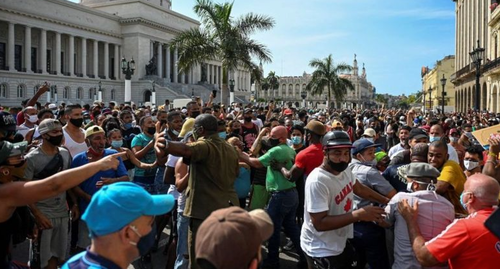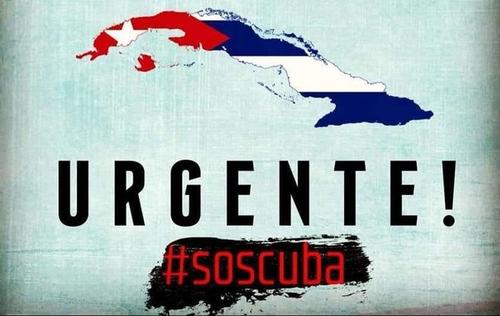Source: Zero Hedge
Tens of thousands of Cubans took to the streets Sunday in rare protests against the communist government. The island nation faces mounting socio-economic issues, food inflation, and other problems exacerbated by the virus pandemic.
Protestors chanted “down with the dictatorship,” “freedom,” and “homeland and life” across multiple Cuban cities. Here are the scenes on the ground.
Ya no hay miedo despertó la Habana, despertó Cuba coño!!! 🔥💖#AbajoLaDictadura #SOSCuba #PatriaYVida pic.twitter.com/CFZs9kz8gn
— Diana🆓🇨🇺 (@veliz_diana) July 11, 2021
#CubaLibre #Cuba No hay mal que dure 100 💯 años y pueblo que lo resista . 👏👏pic.twitter.com/J09IcocsFa
— alba marina messa (@albamarinamessa) July 11, 2021
Protest in Cuba against communism. The Cuban people are fed up with communism, the Cuban people are fed up with the dictatorship, they are fed up with the so-called revolution and they take to the streets. pic.twitter.com/sRxTRBzPZ8
— jorge Felix (@Jorgefelix2006) July 11, 2021
Cubans are fed up with worsening economic problems, food shortage/runaway food inflation, lack of medicine and other essential products, rolling electricity blackouts, as well as the third wave of the virus pandemic.
CUBA: Social media videos of rare anti-government protests in various cities amid reports of gas, electricity and vaccine shortages.
President Miguel Díaz-Canel responds, calls it a provocation and calls on supporters of the revolution to take to the streets.
— Gabriel Elizondo (@elizondogabriel) July 11, 2021
Cuban President Miguel Díaz-Canel blames the uprising on a foreign smear campaign initiated by the US.
“The order of combat is given, the revolutionaries take to the streets,” Díaz-Canel said.
“In several protest areas, internet service on cell phones has been cut off, so news from the island is being interrupted, according to NBC Miami.”
We wonder who started the hashtag on Twitter: “#soscuba.” Remember, social media played a significant role in facilitating Araba Spring more than a decade ago.
US leaders in South Florida, such as Miami-Dade Mayor Daniella Levine Cava, took to Twitter Sunday evening to support the protests. She said:
“We stand united with the Cuban people on the island and across our community at this historic moment in the struggle for freedom, dignity, and basic human rights, Levine Cava tweeted. “May their courageous actions bring about real change and move us closer to the dream of a free Cuba.”
“We’ve never seen anything like this before,” Rep. María Elvira Salazar tweeted. “The Cuban people are determined to be free.”
Tens of thousands of people in #Cuba are protesting at this very moment.
The regime is shutting off the internet on the island. The Castro dictatorship doesn’t want the world to see what’s happening.
Please SHARE & stand with these freedom fighters! #SOSCuba pic.twitter.com/qdKupC9r1N
— María Elvira Salazar 🇺🇸 (@MaElviraSalazar) July 11, 2021
Senator Marco Rubio also chimed in:
Spontaneous street protests breaking out in several cities in #Cuba right now with chants of #NoTenemosMiedo (We Are Not Afraid)
Frustration with the dictatorships incompetence,greed & repression is mounting rapidly pic.twitter.com/eSAr8Xrxpf
— Marco Rubio (@marcorubio) July 11, 2021
Rubio tweeted a video showing “Communist repression squads” preparing to battle protesters.
Here come the Communist repression squads in #Cuba
Still largely being ignored so far by US corporate media outlets. pic.twitter.com/ldprYCmk46
— Marco Rubio (@marcorubio) July 11, 2021
Cuba’s communist government is known for repressive crackdowns on dissent and today’s protest is rather astonishing. It also comes days after the Haitian president was assassinated by a heavily armed hit squad of two Americans and more than a dozen Colombians.
Focusing on Food, the island nation faces one of the worst food shortages since the 1990s. Shortages have resulted in out-of-control food inflation – and much of this was called by SocGen’s Albert Edwards in December.
What’s happening is rapidly rising food costs and other essential goods are producing social instability in the fragile country.
Deutsche Bank’s Jim Reid recently reminded us that emerging markets are more vulnerable to social unrest because their citizens spend a far greater share of their income on food than those in the developed world.
Also, Michael Every and Michael Magdovitz of Rabobank warned about the correlation between rising food prices and major socio-political unrest.
Perhaps, the Arab Spring of 2010 is repeating, but this time it’s happening in the Caribbean. Maybe call it “Caribbean Summer.”




